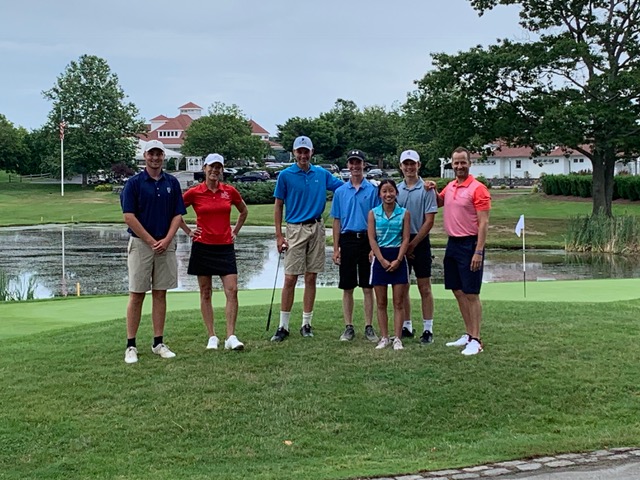
If there are any silver linings to this pandemic, it’s been the coaches and mentors who have stepped up going above and beyond for our participants. The events of 2020 have reinforced the need for programs like First Tee that lift up, support and empower kids to stand strong and grow during challenging situations. The coaches and staff of First Tee programs across the nation have leaned on their creativity, flexibility and adaptive spirits to keep participants engaged and encouraged during a challenging year.
Often, we take for granted how truly invaluable these mentors are in the community with their consistent effort and support for the participants they lead. But we see our coaches putting in the long hours. It’s extra time on the putting green or staying late for one last lesson on the driving range. That time isn’t just about helping a kid improve their golf game. Our coaches are digging deeper, building trust and having meaningful conversations. Many times, those sessions together turn to discussions of dreams beyond the golf course – what the future could hold, current struggles or opportunities for personal growth.
Julia Hardy, a participant from First Tee — New Hampshire, knows firsthand the benefits of having a dedicated and caring First Tee coach. Coach Beth Flint has been a mentor to her for the last seven years and it’s changed her life.
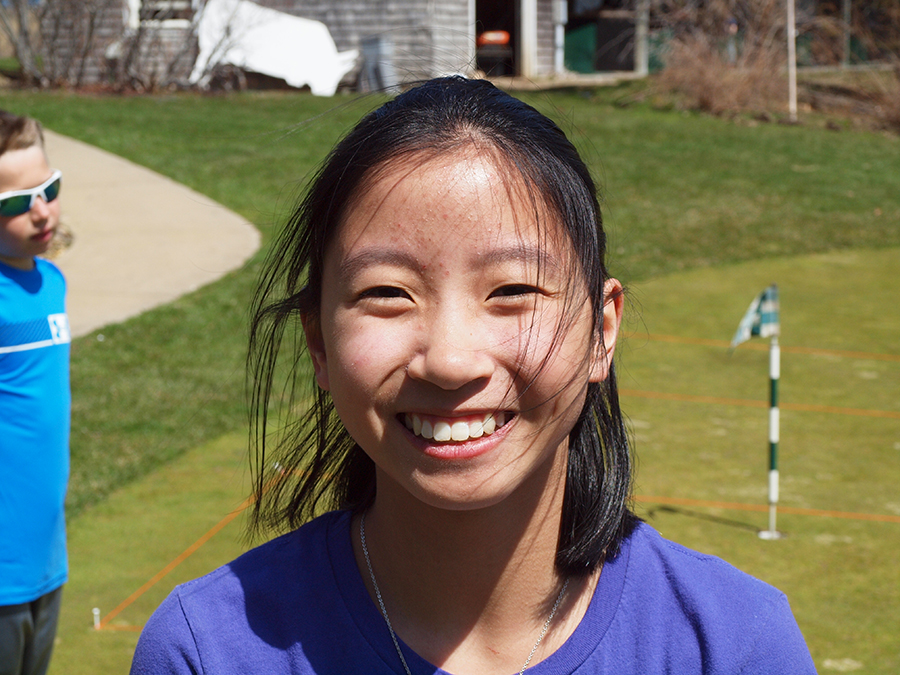
Julia had always been an avid golf fan, and early on she would take lessons at her local driving range, but Julia craved more time on an actual golf course. When she joined First Tee — New Hampshire in third grade, she didn’t realize she was signing up for so much more.
“First Tee was my first time truly playing on a ‘real’ golf course, and I was a little nervous, but the entire environment of First Tee really helped me adapt. The fact that the instructors at the First Tee not only cared about helping me improve my golf skills, but also grow as a person, really helped me connect and feel comfortable in the program. I always felt valued and supported.”
Julia admits that she was incredibly timid when she first started. One of the first things Coach Beth did when they began to work together was challenge her to build confidence. At the Sagamore Golf Course where Julia would practice, the 8th hole requires a difficult shot over water. Beth, knowing that timidity was a theme in Julia’s game and in her life, encouraged her to continue to push through the doubt. Ultimately, it made her a better person.
“Beth would always urge me to have confidence and swing through the ball. With each successive visit to the eighth hole, and each ‘be confident’ spoken, I could feel my confidence grow. Finally, I got to the point where I could approach the eighth hole, push away the doubts, and just hit the ball.”
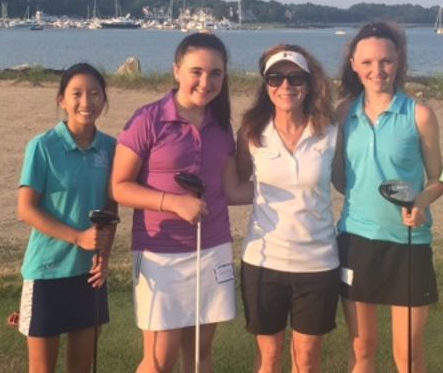
After that, more often than not, the ball would fly over the water. This confidence translated off the course as well. Julia started speaking up more in class and participating in family debates. This growth in confidence allowed her to attack new challenges head on, Julia credits this growth in confidence as the most helpful trait she’s taken away from the First Tee.
Coach Beth agrees. “As she got older, it was beautiful to see her inner strength and self-confidence become greater,” she said. “Advancing through the program, it was obvious that she was a positive influence on others in all aspects of life; not just with golf but at school with friends, in her community, and of course with her family of whom she talks so often about. It has always been a pleasure to golf with Julia – however seeing the wonderful person she has become is the real treasure!”
Julia is now an Eagle certified participant, on track to get her ACE certification. The best part is that this isn’t an isolated story. Across the country, coaches and participants are building lasting bonds, showcasing the growth and evolution of positive relationships that have a ripple effect on the communities they serve and the people they meet each day.
But earlier this year, many chapters were unsure of what the future would hold for coaches and participants. Classes were cancelled and fundraising was unknown. It’s been thanks to generous supporters, like the USGA, who have helped ensure chapters keep their doors open for safe and socially distant programs. First Tee — New Hampshire was one of 51 First Tee chapters to receive a grant from the USGA towards their ongoing commitment to making the game more accessible and welcoming for juniors.
“The USGA’s commitment to investing in First Tee over the years continues to have a lasting impact on the game as well as countless young people in communities across our country,” said Greg McLaughlin, First Tee CEO. “We are offering a meaningful and positive experience through golf that helps young people uncover who they are and grow personally. There is no better sport in which to do this, and we are thankful for the USGA’s confidence in our work.”
Learn more about
character building programs across the country and how to get started with a
First Tee chapter a near you.
 If there are any silver linings to this pandemic, it’s been the coaches and mentors who have stepped up going above and beyond for our participants. The events of 2020 have reinforced the need for programs like First Tee that lift up, support and empower kids to stand strong and grow during challenging situations. The coaches and staff of First Tee programs across the nation have leaned on their creativity, flexibility and adaptive spirits to keep participants engaged and encouraged during a challenging year.
Often, we take for granted how truly invaluable these mentors are in the community with their consistent effort and support for the participants they lead. But we see our coaches putting in the long hours. It’s extra time on the putting green or staying late for one last lesson on the driving range. That time isn’t just about helping a kid improve their golf game. Our coaches are digging deeper, building trust and having meaningful conversations. Many times, those sessions together turn to discussions of dreams beyond the golf course – what the future could hold, current struggles or opportunities for personal growth.
Julia Hardy, a participant from First Tee — New Hampshire, knows firsthand the benefits of having a dedicated and caring First Tee coach. Coach Beth Flint has been a mentor to her for the last seven years and it’s changed her life.
If there are any silver linings to this pandemic, it’s been the coaches and mentors who have stepped up going above and beyond for our participants. The events of 2020 have reinforced the need for programs like First Tee that lift up, support and empower kids to stand strong and grow during challenging situations. The coaches and staff of First Tee programs across the nation have leaned on their creativity, flexibility and adaptive spirits to keep participants engaged and encouraged during a challenging year.
Often, we take for granted how truly invaluable these mentors are in the community with their consistent effort and support for the participants they lead. But we see our coaches putting in the long hours. It’s extra time on the putting green or staying late for one last lesson on the driving range. That time isn’t just about helping a kid improve their golf game. Our coaches are digging deeper, building trust and having meaningful conversations. Many times, those sessions together turn to discussions of dreams beyond the golf course – what the future could hold, current struggles or opportunities for personal growth.
Julia Hardy, a participant from First Tee — New Hampshire, knows firsthand the benefits of having a dedicated and caring First Tee coach. Coach Beth Flint has been a mentor to her for the last seven years and it’s changed her life.
 Julia had always been an avid golf fan, and early on she would take lessons at her local driving range, but Julia craved more time on an actual golf course. When she joined First Tee — New Hampshire in third grade, she didn’t realize she was signing up for so much more.
“First Tee was my first time truly playing on a ‘real’ golf course, and I was a little nervous, but the entire environment of First Tee really helped me adapt. The fact that the instructors at the First Tee not only cared about helping me improve my golf skills, but also grow as a person, really helped me connect and feel comfortable in the program. I always felt valued and supported.”
Julia admits that she was incredibly timid when she first started. One of the first things Coach Beth did when they began to work together was challenge her to build confidence. At the Sagamore Golf Course where Julia would practice, the 8th hole requires a difficult shot over water. Beth, knowing that timidity was a theme in Julia’s game and in her life, encouraged her to continue to push through the doubt. Ultimately, it made her a better person.
“Beth would always urge me to have confidence and swing through the ball. With each successive visit to the eighth hole, and each ‘be confident’ spoken, I could feel my confidence grow. Finally, I got to the point where I could approach the eighth hole, push away the doubts, and just hit the ball.”
Julia had always been an avid golf fan, and early on she would take lessons at her local driving range, but Julia craved more time on an actual golf course. When she joined First Tee — New Hampshire in third grade, she didn’t realize she was signing up for so much more.
“First Tee was my first time truly playing on a ‘real’ golf course, and I was a little nervous, but the entire environment of First Tee really helped me adapt. The fact that the instructors at the First Tee not only cared about helping me improve my golf skills, but also grow as a person, really helped me connect and feel comfortable in the program. I always felt valued and supported.”
Julia admits that she was incredibly timid when she first started. One of the first things Coach Beth did when they began to work together was challenge her to build confidence. At the Sagamore Golf Course where Julia would practice, the 8th hole requires a difficult shot over water. Beth, knowing that timidity was a theme in Julia’s game and in her life, encouraged her to continue to push through the doubt. Ultimately, it made her a better person.
“Beth would always urge me to have confidence and swing through the ball. With each successive visit to the eighth hole, and each ‘be confident’ spoken, I could feel my confidence grow. Finally, I got to the point where I could approach the eighth hole, push away the doubts, and just hit the ball.”
 After that, more often than not, the ball would fly over the water. This confidence translated off the course as well. Julia started speaking up more in class and participating in family debates. This growth in confidence allowed her to attack new challenges head on, Julia credits this growth in confidence as the most helpful trait she’s taken away from the First Tee.
Coach Beth agrees. “As she got older, it was beautiful to see her inner strength and self-confidence become greater,” she said. “Advancing through the program, it was obvious that she was a positive influence on others in all aspects of life; not just with golf but at school with friends, in her community, and of course with her family of whom she talks so often about. It has always been a pleasure to golf with Julia – however seeing the wonderful person she has become is the real treasure!”
Julia is now an Eagle certified participant, on track to get her ACE certification. The best part is that this isn’t an isolated story. Across the country, coaches and participants are building lasting bonds, showcasing the growth and evolution of positive relationships that have a ripple effect on the communities they serve and the people they meet each day.
But earlier this year, many chapters were unsure of what the future would hold for coaches and participants. Classes were cancelled and fundraising was unknown. It’s been thanks to generous supporters, like the USGA, who have helped ensure chapters keep their doors open for safe and socially distant programs. First Tee — New Hampshire was one of 51 First Tee chapters to receive a grant from the USGA towards their ongoing commitment to making the game more accessible and welcoming for juniors.
“The USGA’s commitment to investing in First Tee over the years continues to have a lasting impact on the game as well as countless young people in communities across our country,” said Greg McLaughlin, First Tee CEO. “We are offering a meaningful and positive experience through golf that helps young people uncover who they are and grow personally. There is no better sport in which to do this, and we are thankful for the USGA’s confidence in our work.”
Learn more about character building programs across the country and how to get started with a First Tee chapter a near you.
After that, more often than not, the ball would fly over the water. This confidence translated off the course as well. Julia started speaking up more in class and participating in family debates. This growth in confidence allowed her to attack new challenges head on, Julia credits this growth in confidence as the most helpful trait she’s taken away from the First Tee.
Coach Beth agrees. “As she got older, it was beautiful to see her inner strength and self-confidence become greater,” she said. “Advancing through the program, it was obvious that she was a positive influence on others in all aspects of life; not just with golf but at school with friends, in her community, and of course with her family of whom she talks so often about. It has always been a pleasure to golf with Julia – however seeing the wonderful person she has become is the real treasure!”
Julia is now an Eagle certified participant, on track to get her ACE certification. The best part is that this isn’t an isolated story. Across the country, coaches and participants are building lasting bonds, showcasing the growth and evolution of positive relationships that have a ripple effect on the communities they serve and the people they meet each day.
But earlier this year, many chapters were unsure of what the future would hold for coaches and participants. Classes were cancelled and fundraising was unknown. It’s been thanks to generous supporters, like the USGA, who have helped ensure chapters keep their doors open for safe and socially distant programs. First Tee — New Hampshire was one of 51 First Tee chapters to receive a grant from the USGA towards their ongoing commitment to making the game more accessible and welcoming for juniors.
“The USGA’s commitment to investing in First Tee over the years continues to have a lasting impact on the game as well as countless young people in communities across our country,” said Greg McLaughlin, First Tee CEO. “We are offering a meaningful and positive experience through golf that helps young people uncover who they are and grow personally. There is no better sport in which to do this, and we are thankful for the USGA’s confidence in our work.”
Learn more about character building programs across the country and how to get started with a First Tee chapter a near you. 
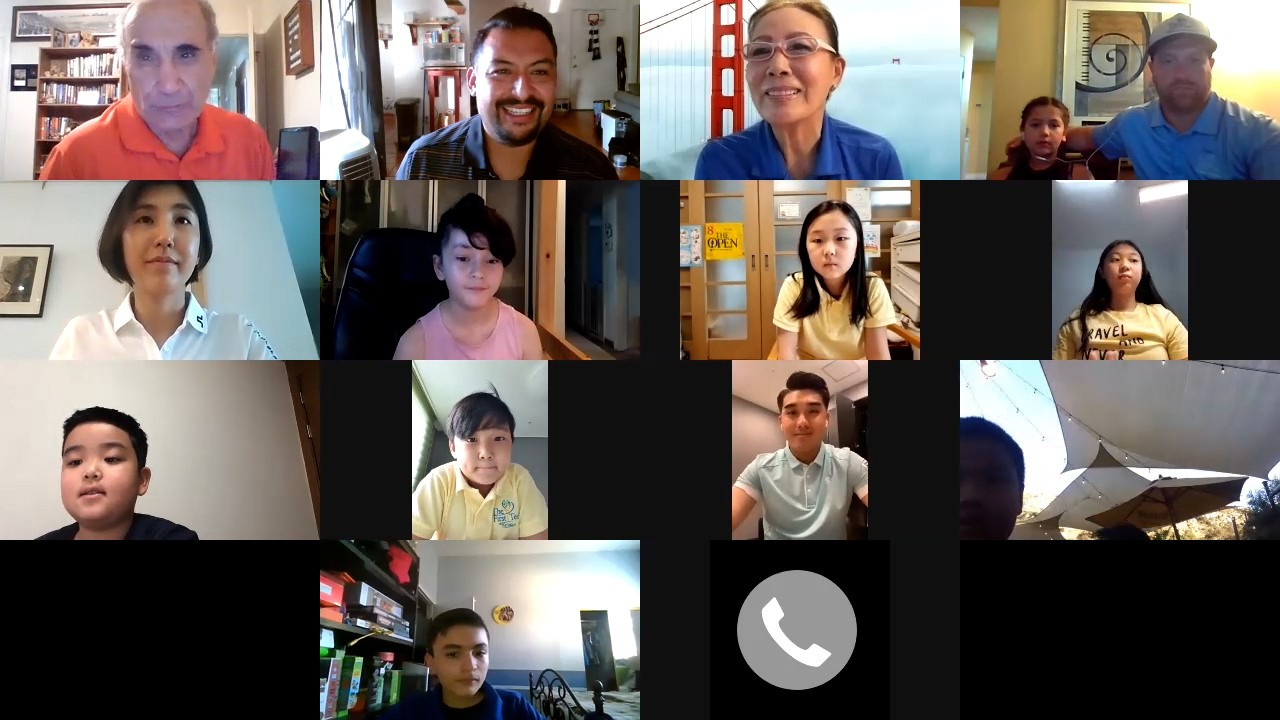 Like our participants, what makes our chapters so special is that each one is unique in its own way. We celebrate their diverse perspectives because it makes our work even more powerful. Yet one thing that remains consistent at every chapter is their passion for supporting the next generation and the communities they live in.
One way our chapters are doing this is by creating a space that makes every individual feel like they belong. A culture of acceptance is deeply rooted in our values as an organization as we seek to understand walks of life that are different from our own.
Two of our chapters, First Tee — Greater Pasadena and First Tee — Korea, have brought this to life in a meaningful new way. In 2019, the two chapters became official sister chapters in an effort for participants to share cultural experiences and explore opportunities beyond their community.
Like our participants, what makes our chapters so special is that each one is unique in its own way. We celebrate their diverse perspectives because it makes our work even more powerful. Yet one thing that remains consistent at every chapter is their passion for supporting the next generation and the communities they live in.
One way our chapters are doing this is by creating a space that makes every individual feel like they belong. A culture of acceptance is deeply rooted in our values as an organization as we seek to understand walks of life that are different from our own.
Two of our chapters, First Tee — Greater Pasadena and First Tee — Korea, have brought this to life in a meaningful new way. In 2019, the two chapters became official sister chapters in an effort for participants to share cultural experiences and explore opportunities beyond their community.
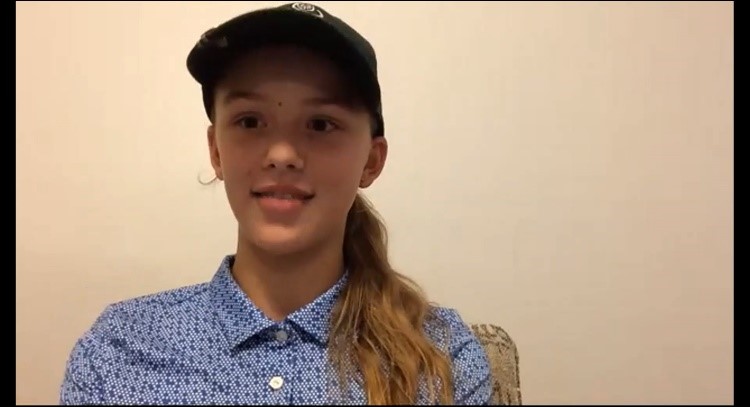 Recently, participants and coaches from the two chapters were able to meet virtually to discuss a trending topic in communities across the globe: returning to school during a pandemic.
During the video call, participants shared how they’re feeling and handling the return to school.
Gloria from First Tee — Korea shared, “I think I should take responsibility for myself because if I don’t follow the rules, I could put my friends and family at risk.”
Through the meeting, the participants realized that they have quite a bit in common despite growing up thousands of miles apart. They’re all adjusting to the “new normal,” and are leaning on the character strengths they’ve developed through First Tee to help conquer these challenges.
Recently, participants and coaches from the two chapters were able to meet virtually to discuss a trending topic in communities across the globe: returning to school during a pandemic.
During the video call, participants shared how they’re feeling and handling the return to school.
Gloria from First Tee — Korea shared, “I think I should take responsibility for myself because if I don’t follow the rules, I could put my friends and family at risk.”
Through the meeting, the participants realized that they have quite a bit in common despite growing up thousands of miles apart. They’re all adjusting to the “new normal,” and are leaning on the character strengths they’ve developed through First Tee to help conquer these challenges.
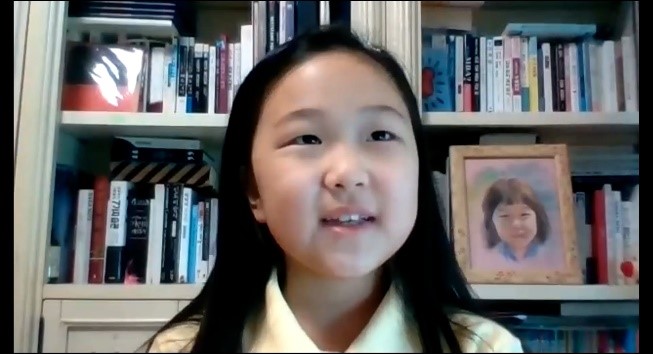 Bob Baderian, Executive Director for First Tee — Greater Pasadena, summed up the experience:
“This very positive partnership between First Tee — Greater Pasadena and First Tee — Korea encourages participants to share their experiences and perspectives and provides opportunities to educate them about the culture and history of their respective countries and communities. These meetings have resulted in increased knowledge and appreciation of cultures and lifestyles between our two chapters.”
Founded in 2006, First Tee — Greater Pasadena has served more than 200,000 kids and teens. First Tee — Korea was founded in conjunction with the 2015 Presidents Cup and is one of six international chapters within the First Tee network.
The sister chapters have a goal to one day provide an in-person experience for their participants to meet.
This pandemic, among other challenges this year, has been more than we could have ever anticipated. It’s stories like these, of coming together to learn, appreciate, and build relationships, that inspire us as we work to empower youth to be game-changers and make this a better world.
Bob Baderian, Executive Director for First Tee — Greater Pasadena, summed up the experience:
“This very positive partnership between First Tee — Greater Pasadena and First Tee — Korea encourages participants to share their experiences and perspectives and provides opportunities to educate them about the culture and history of their respective countries and communities. These meetings have resulted in increased knowledge and appreciation of cultures and lifestyles between our two chapters.”
Founded in 2006, First Tee — Greater Pasadena has served more than 200,000 kids and teens. First Tee — Korea was founded in conjunction with the 2015 Presidents Cup and is one of six international chapters within the First Tee network.
The sister chapters have a goal to one day provide an in-person experience for their participants to meet.
This pandemic, among other challenges this year, has been more than we could have ever anticipated. It’s stories like these, of coming together to learn, appreciate, and build relationships, that inspire us as we work to empower youth to be game-changers and make this a better world.
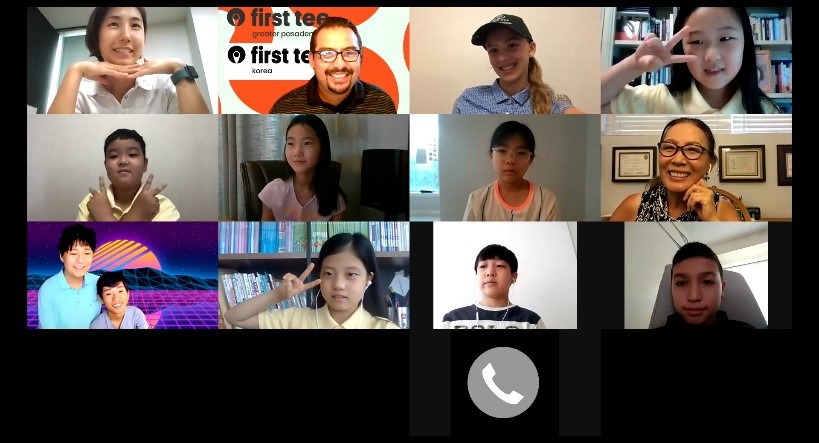
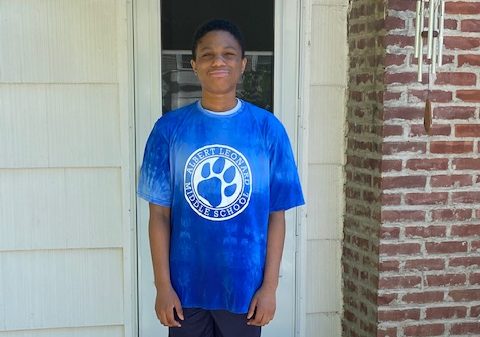
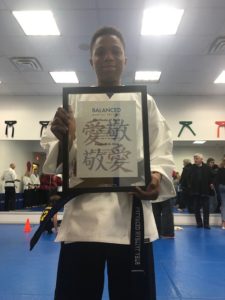 First Tee — Metropolitan New York is one of 51 First Tee chapters to receive a grant from the USGA towards their ongoing commitment to making the game more accessible and welcoming for juniors. In addition to the $200,000 that went to chapter grants, the association pledged $125,000 to help First Tee headquarters develop innovative digital tools that enable stronger connections between juniors, parents, chapters and coaches, bringing the USGA’s total investment to $325,000 for 2020.
“Year after year we are seeing the positive impact that First Tee and other junior programs are having in breaking down barriers and connecting communities through sports,” said Mike Davis, CEO of the USGA. “It is vital for golf’s long-term health that we continue to create pathways for all juniors to participate.”
First Tee brings kids and teens to the game of golf and leverages it as a catalyst for personal growth through experiences that build inner strength, self-confidence, and resilience. Through chapters in 150 communities and more than 10,000 schools and 1,200 after-school partnerships, First Tee reaches kids ages 5-18 from all backgrounds.
First Tee — Metropolitan New York is one of 51 First Tee chapters to receive a grant from the USGA towards their ongoing commitment to making the game more accessible and welcoming for juniors. In addition to the $200,000 that went to chapter grants, the association pledged $125,000 to help First Tee headquarters develop innovative digital tools that enable stronger connections between juniors, parents, chapters and coaches, bringing the USGA’s total investment to $325,000 for 2020.
“Year after year we are seeing the positive impact that First Tee and other junior programs are having in breaking down barriers and connecting communities through sports,” said Mike Davis, CEO of the USGA. “It is vital for golf’s long-term health that we continue to create pathways for all juniors to participate.”
First Tee brings kids and teens to the game of golf and leverages it as a catalyst for personal growth through experiences that build inner strength, self-confidence, and resilience. Through chapters in 150 communities and more than 10,000 schools and 1,200 after-school partnerships, First Tee reaches kids ages 5-18 from all backgrounds.